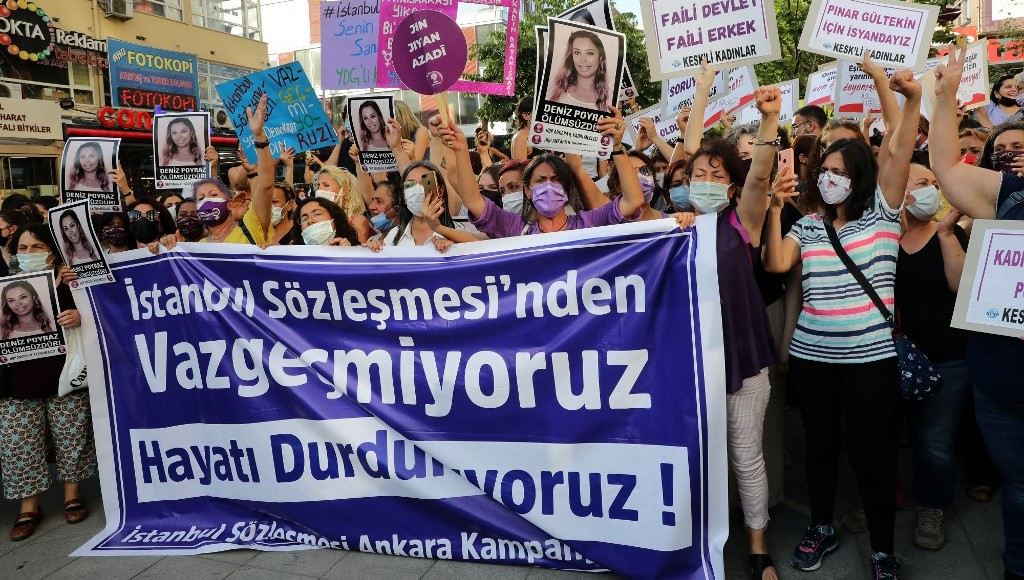Representatives from Turkey’s women’s rights organizations and lawyers will gather early on April 28 in front of the Council of State, Turkey’s highest administrative court, in Ankara, before the court announces its decision on appeals requesting the cancellation of Turkey’s withdrawal from the Istanbul Convention, the Birgün daily reported on Wednesday.
The Council of Europe Convention on Preventing and Combating Violence against Women and Domestic Violence, better known as the Istanbul Convention, is an international accord designed to protect women’s rights and prevent domestic violence in societies and was opened to the signature of member countries of the Council of Europe in 2011.
Turkish President Recep Tayyip Erdoğan sparked outrage in Turkey and the international community after he issued a decree in March 2021 that pulled the country out of the international treaty, which requires governments to adopt legislation prosecuting perpetrators of domestic violence and similar abuse as well as marital rape and female genital mutilation.
Amid calls from women’s rights organizations and world leaders, including US President Joe Biden, for reinstatement of the Istanbul Convention, the Council of State has so far rejected numerous appeals requesting the cancellation of Erdoğan’s executive decree withdrawing Turkey from the convention.
However, new appeals have recently been filed with the court demanding the cancellation of the relevant presidential decree, and the court’s 10th Chamber is expected to announce its decision around 9.45 a.m. on April 28, Birgün said.
Nearly 1,000 lawyers will be among those who will follow Thursday’s hearing, lawyer Yelda Koçak from the Women’s Platform for Equality (EŞİK) told Birgün on Wednesday, adding that they would be at the top court with all their “enthusiasm, willpower and hope.”
Elif Ege, a volunteer for the Mor Çatı Women’s Shelter, said Turkey’s withdrawal from the Istanbul Convention, from which they had benefited to build solidarity with women, took away Turkish women’s security.
“Exiting the convention both increased the ongoing wrong and incomplete practices [regarding women’s rights] and took away our security. Within the past year, we have witnessed a number of such shortcomings. … The Istanbul Convention had offered a holistic policy. Our struggle [to reinstate it] will not end,” Ege said.
The October 29th Women’s Association president and lawyer Şenal Sarıhan also told Birgün that the decision to exit from the agreement a was “unlawful” and therefore, they expected the top court to decide in favor of Turkish women if it had any intention of issuing a ruling in accordance with the law.
Sarıhan also referred to the recent remarks of the top court’s prosecutor, Aytaç Kurt, who said it was impossible for Turkey to withdraw from the Istanbul Convention without the passage of a new law in parliament that would have made the withdrawal legally possible.
The prosecutor, who submitted his opinion to the 10th Chamber of the Council of State in March, argued, “The Istanbul Convention, which is about fundamental rights and freedoms and was adopted in line with the relevant procedures, should remain in force.”
“We are at a point where we can refer to women’s murders in Turkey as gendercide. The right to life is one of the most precious human rights. If you don’t have it, the other rights are worthless. That’s why we won’t give up the Istanbul Convention,” Sarıhan added.
Femicides and violence against women are serious problems in Turkey, where women are killed, raped or beaten every day. Many critics say the main reason behind the situation is the policies of the Justice and Development Party (AKP) government, which protects violent and abusive men by granting them impunity.
According to the We Will Stop Femicide Platform (Kadın Cinayetlerini Durduracağız Platformu), 280 women were murdered in Turkey in 2021.
A survey conducted by Metropoll revealed last year that 52.3 percent of Turks are against the withdrawal from the convention. While more than a majority of participants oppose it, 26.7 percent approve and 10.2 percent had no opinion.



